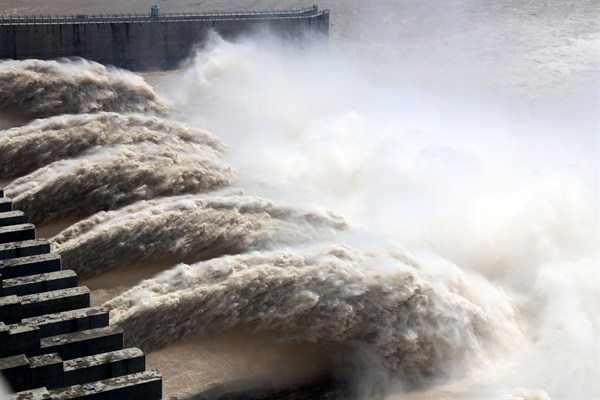The threat of new water wars grows across the globe. Can we resolve the causes of water conflicts before it’s too late?
Although alarmist headlines often announce imminent water wars over scarce resources, the truth is that cooperation over shared waterways, particularly rivers, is historically more common than conflict. In fact, even among bitter enemies, the historical record shows that water conflicts around the world do get resolved, even to the point that international cooperation often increases during droughts.
However, common causes of water conflicts remain a concern. Unilateral actions to construct a dam or river diversion in the absence of a treaty or some other protective international mechanism are highly destabilizing to a region, often spurring decades of hostility before cooperation is even pursued. Similarly, as access to irrigation water is threatened, one result can be mass migrations of out-of-work, disgruntled people from the countryside to the cities—invariably a recipe for political instability.
Water is a vital resource for which there is no substitute, one that ignores political boundaries and has conflicting demands on its use. In the international realm, these problems are compounded by the fact that the international law that governs water is often contradictory. So it is little wonder that water is being portrayed not only as a cause of armed conflict in the past, but as the resource which will bring combatants to the battlefield in this century.
To learn more about the causes of water conflicts around the world, read Troubled Waters: Conflict and Cooperation Over Shared Rivers for FREE with your subscription to World Politics Review.
[marketing]ofie[/marketing]
The Economic Impact of Water Conflicts Around the World
One area of particular danger is not shared waterways, but maritime resources, particularly ocean fishing. Illegal, unreported and unregulated (IUU) fishing threatens the economies of many developing nations, as dramatic reductions in fish stocks would mean economic calamity and the prospect of millions of jobs lost in vulnerable economies. IUU fishing is also linked to criminal smuggling rackets, terrorist organizations, and human trafficking—including children trafficked into the fishing industry as laborers. The good news is that governments, multilateral organizations, the private sector and NGOs have started to see IUU fishing for what it is: a geostrategic challenge with devastating global consequences for conservation, development and security.
To learn more about how addressing IUU fishing could prevent tomorrow’s water wars, read How Illegal Fishing Threatens Development and Security for FREE with your subscription to World Politics Review.
Declining Maritime Resources Escalate the Threat of Water Wars
Illegal catches and China's aggressive approach to its global fishing fleet pose particularly significant dangers to development and security. While China’s fisheries are overexploited and collapsing, its fish consumption is growing. In order to meet the demand, China has built a large, state-subsidized, distant-water fishing fleet, which is getting more hostile, with illegal fishing by Chinese trawlers steadily increasing, especially in China’s East Asia neighborhood. China’s behavior should be considered an early warning sign of the security implications of unmanaged fisheries and illegal fishing as two growing causes of water conflicts around the world.
To learn more about growing hostilities around illegal fishing, read Fishing Wars: China’s Aggression Could Stoke Future Conflict for FREE with your subscription to World Politics Review.
[marketing]ofie[/marketing]
The Fishing Wars Are Already Here, but the Tensions Driving Them Can Be Mitigated
An incident in August that saw clashes between French and British fishing fleets is another example of a failure in transnational management of fish stocks, this time over the highly valuable scallop fisheries off the French coast. France has created seasonal fishing limitations to protect the stock and its sustainable harvest, while Britain allows its fishermen to harvest all year-round. This policy difference led to an international incident. A different conflict among traditional allies recently popped up between Canada and the United States, over lobster fishing in a disputed maritime border region north of Maine. These incidents demonstrate that the “fishing wars” are already here and will continue to rise in intensity and geographic reach. They are transnational and will drive international and regional instability, threatening human security and well-being around the world. That said, there is a lot that can be done to mitigate these tensions.
To learn more about what can be done to manage tensions over maritime resources, read The U.K.-France ‘Scallop Wars’ Won’t Be the Last Fisheries Conflict for FREE with your subscription to World Politics Review.
[marketing]ofie[/marketing]
You can learn all about water wars, the causes of water conflicts,and a wide variety of other world global issues in the vast, searchable library of World Politics Review (WPR):
- The real history of water conflicts around the world, in Troubled Waters: Conflict and Cooperation Over Shared Rivers
- How improvements in water management could create a promising future, in Possible Futures for Transboundary Water Resources
- The economic and security impact of illegal fishing, in How Illegal Fishing Threatens Development and Security
- The growing threat from China’s illegal fishing fleet, in Fishing Wars: China’s Aggression Could Stoke Future Conflict
- How the U.S. Navy could defuse the causes of water conflicts around the world, in The Next Resource War May Be Over Illegal Fishing. Is the U.S. Ready?
- How to mitigate tensions over fishing resources, inThe U.K.-France ‘Scallop Wars’ Won’t Be the Last Fisheries Conflict
[marketing]boilerplate[/marketing]
Editor's Note: This article was first published in July 2018 and is regularly updated.

